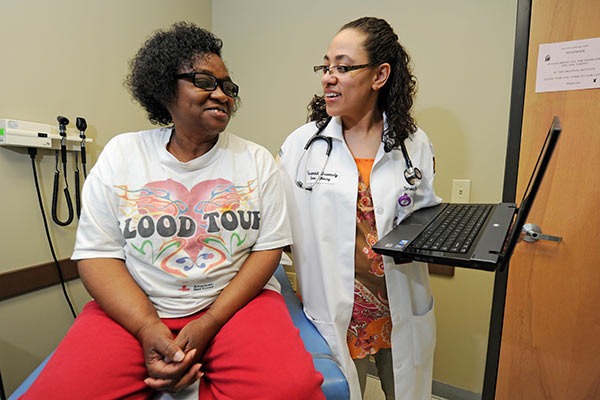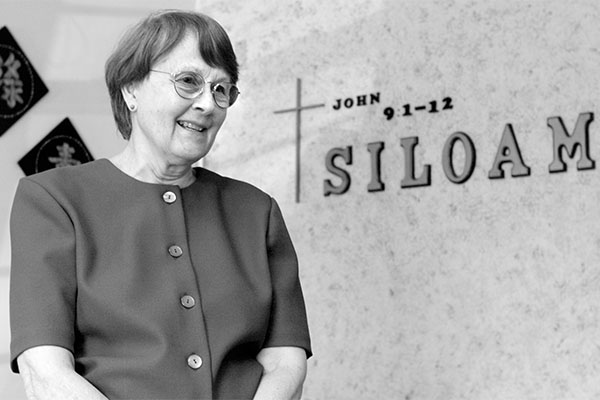“If You Want to Be a Nurse”–Reflections from an Experienced VUSN Nurse in Recognition of Nurses Month
Charlotte Covington, BSN’69, MSN’89, associate professor of nursing, emerita, is a Vanderbilt School of Nursing alumna (twice), former faculty member, past VUSN Alumni Board member and lifelong friend to the school. In honor of Nurses Month, we are happy to share this essay she wrote that captures the reality and dedication of being a nurse.
 One day (I think in the early 2000s) when I was Family Nurse Practitioner faculty, I met with an undergraduate student in Vanderbilt’s Pre-Nursing Society. We met in the C-Room at Rand and talked about nursing and what the Vandy program was like, and I told her about my own nursing journey. It got me thinking about what applicants need to know about what they are about to get into. Here is some information and advice that I think are necessary for someone thinking about nursing as a career—whether as an RN or an Advanced practice Nurse (APN). This advice is based on 40+ years as a nurse/nurse practitioner, but also as a former Vanderbilt faculty member who reviewed applicant files for many years.
One day (I think in the early 2000s) when I was Family Nurse Practitioner faculty, I met with an undergraduate student in Vanderbilt’s Pre-Nursing Society. We met in the C-Room at Rand and talked about nursing and what the Vandy program was like, and I told her about my own nursing journey. It got me thinking about what applicants need to know about what they are about to get into. Here is some information and advice that I think are necessary for someone thinking about nursing as a career—whether as an RN or an Advanced practice Nurse (APN). This advice is based on 40+ years as a nurse/nurse practitioner, but also as a former Vanderbilt faculty member who reviewed applicant files for many years.
- You must want to be a nurse. Sounds stupid, doesn’t it? You must be interested in health care, helping others, coaching, learning, and oh yes, body fluids. You must deal with mean people (patients AND other nurses), and others who think what you do is gross. You must be able to talk to patients and families, to be empathetic to their health/illness, lifestyle, etc.; and you must want to help them, even if you don’t like them. Even as an APN, I still think like a nurse. I can take a history, perform a physical exam, and tease out a diagnosis and come up with a treatment plan … but I always think first as a nurse: where is this patient coming from, where they need to go to get better/care for themselves, what influence does their family, job, education have on what I think they should do?
- Nursing is a profession (dictionary definition: “requiring extensive education or specialized training”), a vocation, a career— it’s not just a job that you can ditch when you become interested in something else. You should be committed to being a nurse for most of your working life.
- If at all possible, you should observe, volunteer or work in the health care field before applying to a nursing program so you know what you are getting into! This is pretty much your responsibility to arrange, so use all your networks (friends, neighbors, relatives) to pull it off. The more you know about and are comfortable with the health care system, the easier it will be for you to concentrate on learning how to care for patients instead of getting used to talking with patients, staff and the health care system.
- You must be flexible. Medicine and health change every day – new drugs, new treatments, new guidelines. There is no way that you will learn everything you need to know to care for patients from lectures; you must be willing to investigate on your own, put in the time with patients in clinicals and in practice and learn from them also. Things you do for patients or prescribe for patients today can be changed tomorrow; a behavior today turns into a “syndrome” tomorrow, so don’t become too rigid. As an APN, I am always learning – from journals, media, others and most of all, from patients themselves.
- Be realistic. Yes, you may want to save the world, work in missions in poor countries, etc., but first you must get experience in your field before you can translate it to another culture and health care system. Become a good nurse, a good nurse practitioner, and then take that experience to others. The other part of being realistic is learning that you cannot change the world today. You can help patients take a small step that will lead to another step, and then a bigger one. Diabetics don’t reduce their blood sugar overnight; it comes a milligram at a time, as they learn about diabetes, why elevated blood sugar is bad, how to check blood sugar, what their meds do, etc. You don’t change or learn things overnight—neither will patients. An FNP student once said, “Small miracles must be celebrated,” and yes, those small steps will make your day.
Is this too much information? I hope I didn’t discourage anyone. Nursing is a GREAT profession; I have never been unhappy with my decision to become a nurse. Nursing has allowed me to work part time, full time, in lots of different areas, and challenged me intellectually. I am proud to tell anyone that I am a nurse!
Update
Twenty years later, now retired, I still stand by this advice, especially for those who are non-traditional students. However, as a naïve, immature seventeen-year-old (the age when I decided to become a nurse), I did none of it! I guess I just grew into it, thinking I would be a floor nurse for most of my working life. Since then, nursing grew into many different categories and disciplines, some of which I got to experience. As I said before, I have never been unhappy in my nursing career!
—Charlotte Covington, 2023
Image: Faculty Emerita Charlotte Covington, BSN’69, MSN’89, circa 1990.






